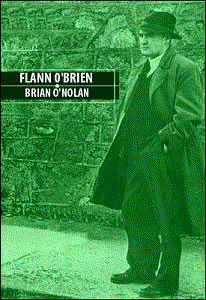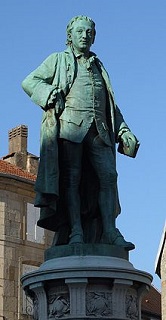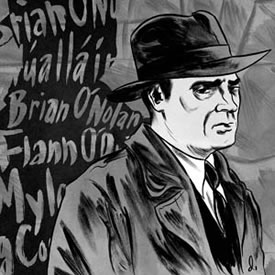De Ierse schrijver Flann O’Brien werd geboren op 5 oktober 1911 in Strabane, County Tyrone. Zie ook mijn blog van 5 oktober 2008 en ook mijn blog van 5 oktober 2009.
Uit: The Poor Mouth
„I AM NOTING down the matters which are in this document because the next life is approaching me swiftly—far from us be the evil thing and may the bad spirit not regard me as a brother!—and also because our likes will never be there again. It is right and fitting that some testimony of the diversions and adventures of our times should be provided for those who succeed us because our types will never be there again nor any other life in Ireland comparable to ours who exists no longer.
O’Coonassa is my surname in Gaelic, my first name is Bonaparte and Ireland is my little native land. I cannot truly remember either the day I was born or the first six months I spent here in the world. Doubtless, however, I was alive at that time although I have no memory of it, because I should not exist now if I were not there then and to the human being, as well as to every other living creature, sense comes gradually.
The night before I was born. it happened that my father and Martin O’Bannassa were sitting on top of the hen-house, gazing at the sky to judge the weather and also chatting honestly and quietly about the difficulties of life.
– Well, now. Martin, said my father, the wind is from the north and there’s a forbidding look about the White Bens; before the morning there’ll be ram and we’ll get a dirty tempestuous night of it that will knock a shake out of us even if we’re in the very bed. And look here! Martin, isn’t it the bad sign that the ducks are in the nettles? Horror and misfortune will come on the world tonight; the evil thing and sea-cat will be a-foot in the darkness and, if ’tis true for me, no good destiny is ever in store for either of us again.
– Well, indeed, Michelangelo, said Martin O’Bannassa, ’tis no little thing you’ve said there now and if you’re right, you’ve told nary a lie but the truth itself.
I was born in the middle of the night in the end of the house. My father never expected me because he was a quiet fellow and did not understand very accurately the ways of life. My little bald skull so astounded him that he almost departed from this life the moment I entered it and, indeed. it was a misfortune and harmful thing for him that he did not, because after that night he never had anything but misery and was destroyed and rent by the world and bereft of his health as long as he lived. The people said that my mother was not expecting me either and it is a fact that the whisper went around that I was not born of my mother at all but of another woman. All that, nevertheless, is only the neighbours’ talk and cannot be checked now because the neighbours are all dead and their likes will not be there again. I never laid eyes on my father until I was grown up but that is another story and I shall mention it at another time in this document.“

Flann O’Brien (5 oktober 1911 – 1 april 1966)
De Duitse schrijfster Charlotte Link werd geboren op 5 oktober 1963 in Frankfurt am Main. Zie ook mijn blog van 5 oktober 2007 en ook mijn blog van 5 oktober 2008 en ook mijn blog van 5 oktober 2009.
Uit: Wenn die Liebe nicht endet
„Ein Schauspieler in Narrenkleidung führte Späße vor, beobachtet von einigen kichernden Dorfmädchen. Er jonglierte mit Kieselsteinen, ließ ein Ei verschwinden und wieder auftauchen
und wackelte mit den Ohren. Ein dicker Wirt bot erwärmtes, schäumendes Bier an, das er aus einer Holzschale in Becher schöpfte, daneben arbeiteten ein Schuhmacher und ein Seifensieder.
Ein Kupferschmied hämmerte auf einem Stück glänzenden Kupfers herum, und ein Leintuchkrämer breitete große saubere Leinwandbahnen auf Brettern aus und pries nicht vorhandenen Zuhörern die Vorzüge der Stoffe.
Die drei Mädchen schlenderten von einem Wagen zum anderen. Sie waren so lange nicht mehr aus dem Kloster herausgekommen, dass ihnen alles neu und aufregend schien. Fasziniert blickten sie auf die Frauen, die in den Wagen saßen, auf verhärmte Gesichter, in denen sie nicht die Entbehrungen und das Elend sahen, sondern nur Zauber des Reisens und der Abenteuer. Im ganzen Reich sind sie schon gewesen, dachte Margaretha, wie großartig muss es sein, so weit herumzukommen!
Und schließlich blieben sie lange vor einem Stand stehen, an dem Schmuck verkauft wurde. Es funkelte alles so bunt im kalten Winterlicht. Margaretha wünschte sich ein Paar Ohrringe mit Steinen aus grünem Glas, Clara konnte sich nicht satt sehen an einem breiten Armband, mit Glasstücken besetzt, und Angela strich über eine zweireihige Kette aus silbrigem Blech. Ein kleiner, dunkelhaariger Mann trat heran.
„Gefällt Ihnen die Kette?“ fragte er. Seine Stimme hatte einen fremdländischen Klang.
„Sie ist wunderschön“, entgegnete Angela. Der Mann ergriff die Kette und hängte sie Angela um den Hals. Er trat einen Schritt zurück.
„Wie ein Engel“, sagte er ehrfürchtig.
Auch die anderen fanden das. Der Schmuck unterstrich auf wunderbare Weise Angelas edle Gesichtszüge.
„Darf ich Ihnen die Kette schenken?“ fragte der Mann.
Angela seufzte.
„Wir dürfen so etwas leider nicht tragen“, meinte sie, „außerdem kann ich das nicht annehmen.“

Charlotte Link (Frankfurt am Main, 5 oktober 1963)
De Chileense schrijver José Donoso (eigenlijk Jose Donoso Yáñez) werd geboren op 5 oktober 1924 in Santiago de Chile. Nadat Donoso drie jaar aan het Pedagogisch Instituut van de Universidad de Chile had gestudeerd, kreeg hij een tweejarige studiebeurs voor de universiteit van Princeton. Hier behaalde hij in 1951 het Bachelordiploma. Tijdens zijn tijd in Princeton, publiceerde hij verhalen in het Engels. Hij werkte daarna als docent Engelse literatuur en Engels op universiteiten in Chili, maar ook als journalist. In 1956 bekroonde de stad Santiago de Chile hem met een prijs voor zijn eerste bundel korte verhalen. Het daarop volgende jaar publiceerde hij zijn eerste roman, De kroning. Voor de Engelse vertaling werd hem in 1962 de William Faulkner Foundation Prize toegekend. In 1958 reisde Donoso naar Buenos Aires, waar hij in contact kwam met belangrijke Argentijnse schrijvers als Jorge Luis Borges en ontmoette hij zijn toekomstige vrouw. In 1964 verliet hij Chili en hij keerde pas zeventien jaar later terug. In die tijd woonde hij vooral in Spanje, maar ook in de Verenigde Staten. Tijdens deze jaren schreef hij zijn beroemde romans. In 1986 schreef hij The Island of the Dead, een kritische roman over het leven in Chili onder de dictatuur van Augusto Pinochet. In 1990 werd hij bekroond met de Premio Nacional de Literatura de Chile, de hoogste onderscheiding voor literatuur in Chili.
Uit: Curfew (Vertaald door Alfred MacAdam)
„Was this an accomplice? What did she know? Did she know that his soft hand perspired when he placed it on the knee of a woman he felt to be powerful? Did Christinita, exempted the same way Judit was, enjoy strange privileges in exchange for keeping Ricardo’s secret? Liliana didn’t know that if her plans for Ricardo worked out, she too was condemned to pardon. The complicity between the two of them was negligible, unimportant, partial, which shouldn’t have surprised her, since these were unimportant human beings who only acquired life in the reflected light of cruelty. Was it important that this man, with his high, falsely noble forehead, vigorous neck, black mustache above loquacious lips, engrossed in a dissertation on Boris, would pay for pardoning her? Was it possible for her to aim the pistol at him and avenge all pardons, including the imprudent Lilianita’s? Because from the beginning in Ada Luffs house–and she, and son Cesar, and all the women knew it–this was no seduction but a murder.
The pup was really splendid, said Ricardo. He’d won prizes at every show his daughter Cristy had entered him in. They were rare, these miniature Dobermans, as ferocious as the regular kind and much easier to train, even if at the beginning you had to punish them so they’d see the difference between what they could and couldn’t do. Farias had punished her with the worst punishment imaginable. No, he hadn’t punished her. He’d condemned her, because ever since her return from Caracas, with the remains of her ideology in rags after so much time and distance, she could not focus on anything but finding the man responsible for the rapes.
When she’d returned, she’d reestablished her network of accomplices from her underground days and sought their knowledge of the urban night–don Cesar, with his contacts and pals and his knowledge of jokes, bars, and wine, and Aury with her beauty-parlor chatter, and Dario’s father and Dario himself, with the kids in his slums, and Ada Luz–enlisting their help in her plan to destroy the past and begin again at zero. But every lead until now had turned into a dead end, and she and the others always came back empty-handed. It was never the right man.“

José Donoso (5 oktober 1924 – 7 december 1996)
De Tsjechische schrijver en politicus Václav Havel werd op 5 oktober 1936 in Praag geboren. Zie ook mijn blog van 5 oktober 2006 en ook mijn blog van 5 oktober 2008 en ook mijn blog van 5 oktober 2009.
Uit: Summer Meditations (Vertaald door Paul Wilson)
Evil will remain with us, no one will ever eliminate human suffering, the political arena will always attract irresponsible and ambitious adventurers and charlatans. And man will not stop destroying the world. In this regard, I have no illusions. Neither I nor anyone else will ever win this war once and for all. At the very most, we can win a battle or two– and not even that is certain. Yet I still think it makes sense to wage this war persistently… This must be done on principle, because it is the right thing to do. Or, if you like, because God wants it that way.
(…)
„It seems I am a naive dreamer trying to reconcile the irreconcilable, i.e., politics and morals. I know that theme well, I have heard it since forever. . . . Violence is well-known to breed violence, which is why most revolutions have degenerated into dictatorships, devouring their own offspring and bringing into the world new revolutionaries prepared for renewed violence, not knowing that they were digging their own graves and confining society in a vicious circle of revolutions and counter-revolutions. Communism was defeated by life, by thought, by integrity. Yet [there are] those who, even today, assert that politics is above all a manipulation of power, of public opinion, and that morals have no place in it. Politicking is not politics. . . .
True politics, worthy of the name — and the only kind I will practice — is the politics of service to one’s neighbor. Service to the community; service to those who will succeed us. Its origin is moral because it is nothing but responsibility realized toward all and by all. It is such responsibility that in itself constitutes superior responsibility by the fact that it is based in metaphysics; it is nourished by certitude, conscious or unconscious, that nothing ends by death, that all is recorded forever, all is appraised elsewhere, somewhere “above us” in what I have called the memory of being, in that part which is inseparable from the mysterious order of the cosmos, of nature, and of life, which believers call God, and to whose judgment all are subject.“

Václav Havel (Praag, 5 oktober 1936)
De Argentijnse dichter, essayist en literatuurwetenschapper Roberto Juarroz werd geboren in Coronel Dorrego 1925. Zie ook mijn blog van 5 oktober 2008 en ook mijn blog van 5 oktober 2009.
Hoe het zwart afschrapen…
Hoe het zwart afschrapen,
de smaak van het zwart,
de klank van het zwart,
de zwartheid van zwart?
Hoe het zwart raspen,
zijn voedsel, zijn deeg,
totdat de specerij van het wit
in zijn kieren is doorgedrongen?
Hoe het zwart overstromen
met een visie in staat het te belopen
en op zijn bodem iets anders te vinden
dan het spoor van de dood?
Hoe in het zwart andere kleuren vinden,
blauwzwart, roodzwart, liefdezwart, zelfmoordzwart,
of in zijn ingewand eenvoudig verkruimelen
de kleur van het leven van de mens?
Vertaald door Mariolein Sabarte Belacortu
A man spells out his tiredness
A man spells out his tiredness.
All at once as he spells
he meets some strange capital letters,
unexpectedly alone,
unexpectedly tall.
They weigh more on the tongue.
They weigh more but they get away
faster and hardly
can they be spoken.
His heart crowds into the roads
where death is exploding.
And he meets, as he goes on spelling,
bigger and bigger capital letters.
And a great fear chokes him
of finding a word
written all in capitals
and not being able to pronounce it.
Vertaald door W. S. Merwin
I’m awake
I’m awake.
I’m asleep.
I’m dreaming that I’m awake.
I’m dreaming that I’m aslseep.
I’m dreaming that I’m dreaming.
I’m dreaming that I’m dreaming
that I’m awake.
I’m dreaming that I’m dreaming
that I’m asleep.
I’m dreaming that I’m dreaming
that I’m dreaming.
I’m awake.

Roberto Juarroz (5 oktober 1925 – 31 maart 1995)
De Zweedse schrijver en journalist Stig Dagerman werd geboren op 5 oktober 1923 in Älvkarleby. Zie ook mijn blog van 5 oktober 2008 en ook mijn blog van 5 oktober 2009.
Uit: Schwedische Hochzeitsnacht (Vertaald door Herbert G. Hegedo)
„Wer klopft an das Fenster der Braut?
I m m e r l a n g s a m – so schuf Gott die Schnecke. Oder wer es sonst war, der sie schuf. Doch wer es auch war, er hat es gut gemacht. Denn wozu braucht die Schnecke die Eile? Worauf sie kriecht, das gehört ihr. Wohin sie sich wendet in der Welt, ihr Haus steht auf eigenem Grund. Sie braucht sich nicht die Beine abzulaufen, um rechtzeitig zur Versteigerung, Pfändung oder Notschlachtung nach Hause zu kommen. Die Schnecke trägt ihr Haus auf dem Rücken. Solch einen Rücken müsste man haben.
Aber wenn man ihn hat, dann ist man schlecht angesehen. Da können die Sonnabendkätner, Steineputzer und Birkenrindensauger von Långmo auf ihren Brücken stehen und glotzen und Kautabak mahlen. Einige haben nur das zu tun. Einige haben ganz teuflische Brücken vor ihren zerfallenen Katen. So geschickt, dass sie die geringste Kleinigkeit, die in Fuxe geschieht, beobachten können. Sitzt man so vor dem Haus mit der »Smålänning« in der Hand, dann können die sie sogar lesen, wenn es hell genug ist. Und baut man ein Stockwerk hinzu, so stehen sie auf den Brücken und gaffen, bis das Maul voller Fliegen ist. Spuck aus! Viktor ist nun wohl ganz übergeschnappt. Tja. So hat man es sich auf den Brücken erzählt. Als ob die Bude nicht gelangt hätte für den Angeber-Palm, so wie sie seit den Tagen von Schwiegervater Asp Johannes war. Aber nein! Rauf mit einer Bude auf die Bude! Einen Herrenhof hat er sich wohl vorgestellt. Ein Gut mit zwölf Hektar. Herr Gutsbesitzer muss man vielleicht allmählich zu dem früheren Knecht sagen. Ein Pferd des Herrn Gutsbesitzers soll Druse gekriegt haben, und die Tochter des Herrn Gutsbesitzers soll eine Stellung bei einem Prokuristen in der Stadt haben. Die mit dem Unehelichen natürlich. Das erste Mal, das man getauft wird, rechnet nicht. Nur die anderen Male gelten. Der einzige Name, den man hat, ist der, den man mit Scham trägt. Den man von den Klatschbasen und Spitzzungen bekommt. Und hat man ein Haus gebaut, das ein Haus auf dem Rücken trägt, dann heißt man Schnecke, bis man stirbt.“
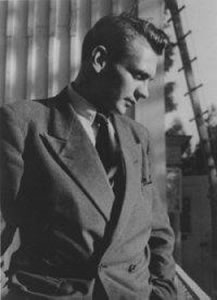
Stig Dagerman (5 oktober 1923 – 5 november 1954)
De Hongaars-sprekende Joegoslavische schrijver Ervin Sinko (eig. Franz Spitzer) werd op 5 oktober 1898 in Apatin (Vojvodina) geboren. Sinko ging naar het gymnasium en werd lid van de Sociaal-Democratische arbeidersbeweging. Hij ging naar school, toen de Eerste Wereldoorlog begon. In 1916 werd hij opgeroepen voor het leger en naar oostelijk front gestuurd. Daar raakte hij geïnteresseerd in de Russische Revolutie. Na de oorlog ging Sinko naar in Boedapest. In 1919 nam hij deel aan de Hongaarse radenrevolutie. Na hun nederlaag bleef Sinko ongeveer een maand ondergedoken in Boedapest en hielp Georg Lukács in de partij organisatie. Na verscheidene jaren van ballingschap in Wenen, keerde hij in 1926 terug naar Joegoslavië. In ballingschap schreef hij zijn roman, The Optimist. In de roman, zijn de gebeurtenissen van de Hongaarse radenrevolutie 1918/1919 beschreven. Om zijn manuscript te publiceren trok Sinko in 1932 naar Parijs. Daar ontmoette hij de voormalige Hongaarse minister-president Mihály Károlyi. Karolyi beval het manuscript aan bij Romain Rolland. Na bemiddeling door Rolland ging Sinko in 1935 naar Moskou. De sfeer van politieke censuur en het conformisme in de zogenaamde socialistische Sovjet-Unie bereikte in de tijd van de Moskouse processen hun hoogtepunt. In 1937 werd Sinko’s verblijfsvergunning niet verlengd en keerde hij terug naar Parijs. In hetzelfde jaar verhuisde Sinko naar Zagreb, waar hij woonde tot aan zijn dood in 1967.
Uit: Roman eines Romans – Moskauer Tagebuch (Vertaald door Edmund Trugly jun)
“Ich glaube an einen Morgen, an einen sozialistischen Morgen, wenn die Menschen unter so viel menschlicheren Voraussetzungen leben, daß sie gar nicht verstehen können, wie wir jemals diese heutige sowjetische Atmosphäre der Renaissance finsteren Aberglaubens, der Dummheit, der Selbstgefälligkeit, der Scheußlichkeit und der durchsichtigen Lüge als Grundprinzip staatlicher Propaganda überhaupt ertragen konnten. Ich hoffe und glaube, daß diese Menschen gar nicht mehr begreifen können, wie wir in dieser Atmosphäre überhaupt zu leben vermochten, die aber dennoch gegenüber der äußeren, faschistischen, kapitalistischen Welt die revolutionäre Negation nicht nur vertritt, sondern auch objektiv darstellt. Und weil ich an einen Morgen, an einen sozialistischen Morgen glaube, der im heutigen Zustand der Sowjetunion unbedingt eine Phase der Rückständigkeit, der unmenschlichen Willkür und der entmenschten Beamten erblicken wird, richte ich mich auf und versuche, über die Zeitmauer hinweg meine Hand einem jungen Menschen zu reichen, der einmal leben wird, wenn der Rückblick auf unsere Zeit nur noch eine in Schulbüchern festgehaltene böse Erinnerung einer unglücklichen Menschheit bedeutet.”

Ervin Sinko (5 oktober 1898 – 26 maart 1967)
De Franse schrijver, filosoof en kunstcriticus Denis Diderot werd geboren in Langres op 5 oktober 1713. Diderot was een prominente persoonlijkheid in wat als De Verlichting bekend zou worden. Hij was tussen 1750 en 1776 met D’Alembert redacteur van de beroemde Encyclopédie en schreef zelf ongeveer 6000 van de 72.000 artikelen in die encyclopedie. De encyclopedie kende veel tegenstanders, in 1759 werd de encyclopedie formeel verboden. Het werk ging vanaf die tijd clandestien door. De encyclopedie was door de nadruk op religieuze tolerantie en vrijheid van gedachten, en een democratische geest, een bedreiging voor de aristocratie. In 1773 onderneemt Diderot een journalistieke reis door Holland. (Voyage en Hollande). Samen met Baruch Spinoza en Pierre Bayle is Diderot de belangrijkste filosoof van de Radicale Verlichting. Diderot was voor de vrijheid van meningsuiting en godsdienst, hierover heeft hij ook enkele boeken geschreven. Diderot droeg ook bij aan de literatuur, in het bijzonder met zijn werk Jacques Le Fataliste, een satirische roman waarmee de auteur conventies over de structuur en inhoud van romans aan de kaak stelde, terwijl hij ook filosofische ideeën met betrekking tot de vrije wil onderzocht.
Uit: Jacques de fatalist en zijn meester (Vertaald door Martin de Haan)
„Hoe hadden ze elkaar ontmoet? Bij toeval, zoals iedereen. Hoe heetten ze? Wat gaat u dat aan? Waar kwamen ze vandaan? Van de dichtstbijzijnde plaats. Waar gingen ze heen? Weet een mens waar hij heen gaat? Wat zeiden ze? De meester zei niets, en Jacques zei dat zijn kapitein zei dat alle goede en slechte dingen die ons hier beneden overkomen, daar boven geschreven staan.
MEESTER: Dat is een prachtig gezegde.
JACQUES: Mijn kapitein voegde eraan toe dat elke kogel die uit een geweer kwam zijn bestemming had.
MEESTER: En hij had gelijk…
Na een korte stilte riep Jacques uit: ‘De duivel hale de herbergier en zijn herberg!’
MEESTER: Waarom je naaste naar de duivel wensen? Dat is niet christelijk.
JACQUES: Omdat ik me zat te bedrinken met zijn slechte wijn en daardoor onze paarden naar het wed vergat te brengen. Mijn vader merkte het, hij werd boos. Ik schudde mijn hoofd, hij pakte een stok en liet die onzacht op mijn schouders neerkomen. Er trok een regiment langs, op weg naar het kamp voor Fontenoy; uit pure nijd nam ik dienst. We komen aan, de slag barst los.
MEESTER: En jij ontvangt de kogel die voor jou bestemd was.
JACQUES: Goed geraden: een schot in mijn knie. En God weet wat dat schot voor goede en slechte dingen met zich mee heeft gebracht, die allemaal net zo hecht in elkaar grijpen als de schakels van een kinketting. Zo zou ik zonder dat schot denk ik nooit van mijn leven verliefd zijn geweest, en ook niet mank.
MEESTER: Je bent dus verliefd geweest?
JACQUES: Nou en of!
MEESTER: En dat kwam door een geweerschot?
JACQUES: Ja, door een geweerschot.“
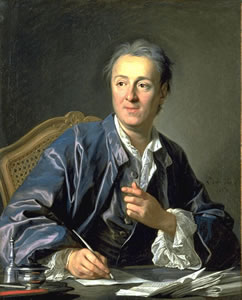
Denis Diderot (5 oktober 1713 – 31 juli 1784)
Portret door Louis-Michel van Loo, 1767


